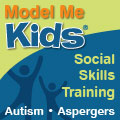Now THAT was uncalled for...
In a town not too far from where our family lives, there is a fellow autism mom who recently published her first book. As a result, she is rapidly achieving celebrity status, and her name and the message she is trying to get out are now surfacing everywhere, as are various pieces of her writing. I've read her book as well as her previous writings (which I very much enjoyed), and I've heard her speak and, while she makes no secret of which side of the Great Divide she stands on, she's always come across as being respectful of other parent's choices, even if those choices are very different from the ones she made for her son.
Imagine my shocked surprise when I came across the following writing. While a good part of the article does focus on describing how SHE lost sight for a while of her child as a child and only saw him as a collection of problems that needed to be fixed, and while her intent probably was to caution other parents of autistic children to not fall into that same trap, that intent was completely torpedoed by how she choose to raise this issue.
She started this piece with a reference to that unfortunately 5-year old boy, Abubakar Tariq Nadama, and implied that this poor child's parents fell 'prey to the desire to push their [child] toward perfection, to develop every possible edge so that they might have it all.' And while that is a rather sensationalist and speculative view at best of what Abubakar's parents where trying to achieve - as we simply don't know what they were trying to achieve-, I am really upset by the factual inaccuracies in that first sentence of the article. Abubakar did NOT die as a result of a treatment intended to cure his autism. He died as the result of an incredibly stupid mistake made by his treating physician - a mistake for which I sincerely hope this physician will be held accountable. Just like any physician that makes a mistake of this magnitude, regardless of whether the patient was autistic or not, should be held accountable. Secondly, the treatment this child underwent, chelation, was not intended to cure his autism. It was intended to address his heavy metal poisoning. The writer of this article is an intelligent and articulate person - one can't help but wonder what her underlying intent was of starting her writing with such an inflammatory, and inaccurate, statement.
But then it gets even 'better'. In the second paragraph of this article, she describes her observations as to how some parents of neurotypical children in her town will go to great lengths to push their children to the maximum achievement, potentially to the point of destroying something in the child or the parent. She then compares this type of behavior to those parents of autistic children that will go to great lengths to cure their children. Well, regardless of whether there is a cure for autism or not - and that is something parents of autistic children will have to decide for themselves based upon ALL information that is out there and not just the limited information force-fed to the (ignorant?) masses by the CDC, the NIH and the AAP - those of us that so-called 'treat' our children do not do this to get that dream child we thought we were going to get, but to address our children's very real medical problems (like the ones I listed in yesterday's post). And we certainly do not treat these medical problems in a desperate attempt to get the child into that preppy Music School or Tennis Program. I find that 'suggestion' very offensive, and I wonder if anybody would dare to make a similar statement about a parent of a neurotypical child, where the parent is attempting to treat similar health problems with a similar drive.
In the remainder of the article, she gives a very brief account of the trials and tribulations her family went through with her son. I respect her for her openness and honesty, just as I respect the choices that she ended up making for her son. But that's all there is to it - it's HER account of HER experiences and the decisions SHE made for HER son. They hold little bearing on the choices that another parent of another autistic child needs to make. And while the article ends with a very valid plea, that 'the tragedy is not autism, nor is it children who don't achieve external signs of greatness; the tragedy is children who are not allowed the chance to be children', what greatly troubles me is the (unspoken?) implication that those of us that are not satisfied with merely managing the most difficult aspects of autism are not allowing our children the chance to be children. Au contraire - actively treating those conditions that quite frequently directly contribute to our children's most difficult autistic behaviors is ALL ABOUT allowing our children the chance to be children. But it may be that my definition and the writer's definition of what 'allowing our children the chance to be children' entails are fundamentally very different. And the writer is entitled to forming her own definitions based on her particular circumstances, just like I am entitled to forming mine based on my circumstances.
But I can't help but wonder what the writer was truly trying to accomplish with the statements and comparisons made in the first two paragraphs of the article. Were these really necessary? And yes, in light of the message she carries out in her public appearances, I had expected more respect for choices that are different from her own.









